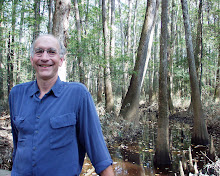I'm coming out of the closet. Or more accurately, the voting booth.
I know it's fashionable to stand up as a United State's citizen and proudly proclaim that I'll be exercising my hard-won and valued right to vote this November 6 in the national election. But I won't. Because I'm not. Voting, that is. Not for candidates running for national office.
What we have here in Washington, D.C., if it ever was, is no longer democracy. From where I sit in my day-upon-day office, a few blocks from the nation's Capitol and Supreme Court, and an even few more blocks from the White House, is theater. More than that, it's theater of the absurd. And I won't be patronizing that theater anymore, thank you very much. At least not until the actors drop their facades and masks, and start facing reality; and begin acting real.
Instead of pouring over what substitutes for news, mining for nuggets of truth; instead of weighing the inconsequential, shallow, hollow political alternatives available to chose from on the national stage; instead of walking to my precinct's voting location; instead of pushing a button on the voting terminal screen; instead playing the part of a willing participant in a theatrical, empty "democracy," I'll spend my time holding hands with my wife, walking with my dogs, talking on the phone with my grandchildren, listening to my mother's wisdom, reading an enthralling novel.
The lover's hand, dogs' pants, child's laughter, mother's words and novel's fiction in the end will likely hold more truth than the emptiness of what passes for democracy within Washington's halls of power.
What we have here in Washington, D.C., if it ever was, is no longer democracy. From where I sit in my day-upon-day office, a few blocks from the nation's Capitol and Supreme Court, and an even few more blocks from the White House, is theater. More than that, it's theater of the absurd. And I won't be patronizing that theater anymore, thank you very much. At least not until the actors drop their facades and masks, and start facing reality; and begin acting real.
Instead of pouring over what substitutes for news, mining for nuggets of truth; instead of weighing the inconsequential, shallow, hollow political alternatives available to chose from on the national stage; instead of walking to my precinct's voting location; instead of pushing a button on the voting terminal screen; instead playing the part of a willing participant in a theatrical, empty "democracy," I'll spend my time holding hands with my wife, walking with my dogs, talking on the phone with my grandchildren, listening to my mother's wisdom, reading an enthralling novel.
The lover's hand, dogs' pants, child's laughter, mother's words and novel's fiction in the end will likely hold more truth than the emptiness of what passes for democracy within Washington's halls of power.
